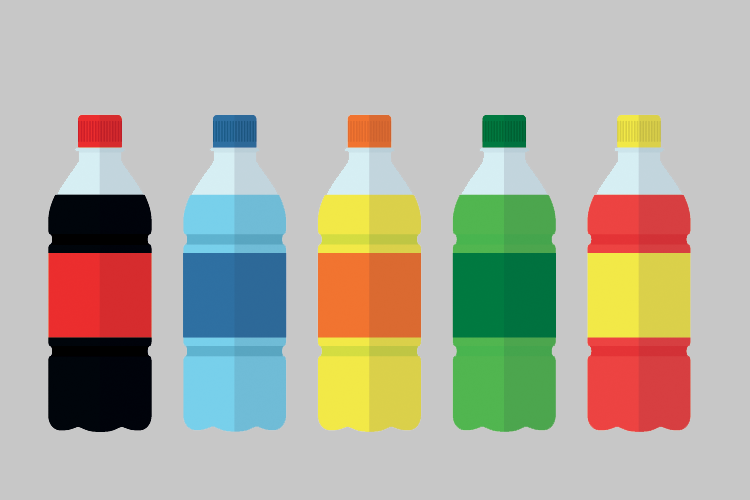Blog
Heavy metals, PET and soft drink bottles
 In case the super refined sugary stuff wasn’t enough to worry us when knocking back sweetened beverages, there may be cause for concern for the presence of heavy metals in soft drinks, according to a recent study.
In case the super refined sugary stuff wasn’t enough to worry us when knocking back sweetened beverages, there may be cause for concern for the presence of heavy metals in soft drinks, according to a recent study.
A heavy metal drink
The Indian Express recently reported that there is a concern for leaching of heavy metals such as antimony, cadmium, and lead from bottles made of PET into a variety of popular PepsiCo and Coca-Cola soft drinks. The testing was undertaken by All India Institute of Hygiene and Public Health under instruction by The Health Ministry in India.
What is PET you may ask?
It stands for polyethylene terephthalate, and is a plastic derived from crude oil. It can be recycled up to 20 times into new bottles, which can be considered a positive for the environment.
However, this report found levels of cadmium, for example, at 16mcg (0.016mg)/L in 600ml of Mountain Dew. The WHO recommends limiting levels of cadmium in drinking water to 3mcg/L. Adverse effects from cadmium overexposure include softening of bones and kidney dysfunction.1
And high temperatures may enhance the heavy metal leaching.
It was reported that levels of lead in 7UP and Sprite were 0.004 mg/L and 0.007 mg/L respectively at room temperature. Increasing the temperature to 40 degrees Celcius over 10 days increased the levels to 0.006 mg/L and 0.009 mg/L – the latter just below the WHO recommendation of a 10mcg/L limit. High exposure to lead can lead to gastrointestinal and neurological disorders and is particularly dangerous for children and pregnant women.2
In a separate study, it was revealed heating and microwaving of PET saw significant leaching of the heavy metal antimony. Other heavy metals were leached but not to significant amounts.3
A recent literature review out of the U.S. (funded by Cal Poly Packaging Research Consortium) found chromium, cadmium and lead in 27 of 200 plastic products tested.4
Whilst this review deemed the plastic mostly safe for the packaging of vegetables and fruit (like pre-packed salad bags), the presence of citric acid (5% of the solution) in beverages has been found to increase heavy metal concentrations in the liquid inside the plastic bottle.4 And artificially made citric acid is found in the soda pop favourites such as Coke, Pepsi, Mountain Dew, Sprite, and Fanta to name a few.
And no doubt you have seen the magical ability for soft drinks like cola to break stuff down, like the cola coin cleaning experiments.
Our general diet and lifestyle will naturally expose us to heavy metals like lead and cadmium, and a teeny amount is normal. But do we want to increase that level of exposure to potentially toxic amounts?
Then there is the concern PET could be providing the body with unhelpful endocrine disrupting chemicals (EDC).
PET messing with our hormones
Not only is soft drink packaged in PET plastics, water can be too.
It has been found when comparing the same spring water bottled in glass compared with PET, the PET water has 3 times more estrogenic activity.5 Excess estrogen throughout the body can be associated with mood alterations like depression, enlarged breasts, fatigue and a number of other symptoms in both men and women, and irregular periods in the ladies. Not fun.
A review article published in Endocrine Reviews suggests EDCs leached into liquid beverages could be messing with our hormones and possibly linked to obesity, cardiovascular disease, infertility and other health conditions, impacting quality of life.6
The review authors say, “…it is logical to conclude that low-dose testing, followed by regulatory action to minimize or eliminate human exposures to EDCs, could significantly benefit human health.” 6
Re-think that sugary (and plastic bottle) drink
Even with high safety standards for heavy metal contamination in our drink (and food), if you want another reason to rethink that sugary drink, this may be it!
Instead, reach for your sturdy and reusable stainless steel or glass water bottle, fill with filtered or tap water, cram in some fresh mint and a few slices of lemon, and be on your very refreshing merry way!
Your body (and the environment) will be grateful 🙂
By Angela Johnson (BHSc Nut. Med.)
References:
- WHO 2010a, ‘Exposure To Cadmium: A Major Public Health Concern’, World Health Organisation, viewed 11 October 2016 <http://www.who.int/ipcs/features/cadmium.pdf>
- WHO 2010b, ‘Exposure To Lead: A Major Public Health Concern’, World Health Organisation, viewed 11 October 2016 <http://www.who.int/ipcs/features/lead..pdf>
- Cheng, X, Shi, H, Adams, CD, & Ma, Y 2010, ‘Assessment of metal contaminations leaching out from recycling plastic bottles upon treatments’, Environmental Science and Pollution Research, no. 7, p. 1323.
- Whitt, M Brown, W Danes, JE & Vorst, KL 2015, ‘Migration of heavy metals from recycled polyethylene terephthalate during storage and microwave heating’, Journal of Plastic Film and Sheeting, [Epub]
- Wagner, M, & Oehlmann, J 2011, ‘Endocrine disruptors in bottled mineral water: Estrogenic activity in the E-Screen’, Journal of Steroid Biochemistry & Molecular Biology, vol. 127, no. 1/2, pp. 128-135.
- Vandenberg, LN
Colborn, Theo
Hayes, TB Heindel, JJ
Jacobs, DR
Lee, D
Shioda, T Soto, AM
vom Saal, FS
Welshons, WV Zoeller, RT
& Myers, JP 2012, ‘Hormones and Endocrine-Disrupting Chemicals: Low-Dose Effects and Nonmonotonic Dose Responses’, Endocrine Reviews, vol. 33, no. 3, pp. 378-455.











